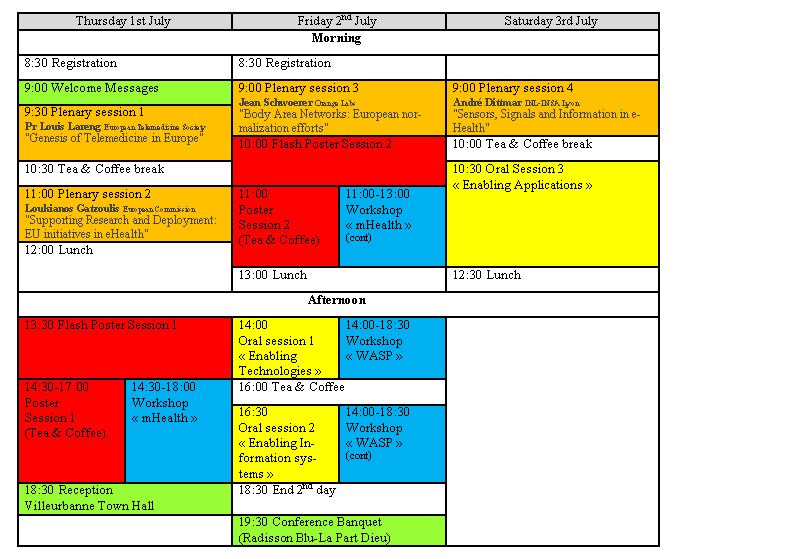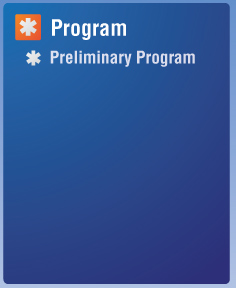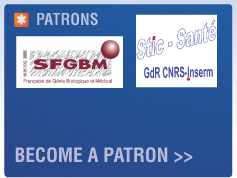
| |
Final Program

Oral session 1 « Enabling Technologies » (Friday 2nd July, 14:00):
Chairs: Nigel Lovell, Isao Nakajima
“FBG-based smart textiles for continuous monitoring of respiratory movements for healthcare applications” Julien De jonckheere
“Exploiting Femtocellular Networks for Emergency Telemedicine Applications in Indoor Environments” Edward Mutafungwa
“Design of a physical simulator to improve the management of infants chest physiotherapy cares” Christine Barthod
“Accelerometer's Position Free Human Activity Recognition Using A Hierarchical Recognition Model” Adil Khan
“A Low-Cost Platform for Testing Activities in Parkinson and ALS Patients” Paul Bustamante
“iMAT: Intelligent Medication Administration Tools” Peihsuan Tsai
Oral Session 2 “Enabling Information Systems” (Friday 2nd July, 16:30):
Chairs: Jocelyne Fayn, Paul Rubel
“A Symbian-based Mobile Solution for Intra-Body Temperature Monitoring” Orlando Pereira
Introducing Knowledge in the Process of Supervised Classification of Activities of Daily Living in Health Smart Homes” Anthony Fleury
“Challenges in the Processing of Audio Channels for Ambient Assisted Living” Michel Vacher
“Artifacts Mitigation in Ambulatory ECG Telemetry” Harinath Garudadri
“Technical Development and Clinical Evaluation of Intelligent Continence Management System at Nursing Home” Aung Aung Phyo Wai
“An Application of Sensor Networks with Data Mining to Patient Controlled Analgesia” Yuh-Jyh Hu
Oral session 3 “Enabling Applications” (Saturday 3rd July, 10:30):
Chairs: Joel Rodriguez, Weider Yu
“Proposed Deployments to Provide E-Healthcare in Bangladesh: Urban and Rural Perspectives” Raqibul Mostafa
“Real-Time Biosurveillance Pilot in India and Sri Lanka” Nuwan Waidyanatha
“Ubiquitous but non invasive evaluation of the activity of a person from a unique index built on the electrical activities on the residential power line” Pierre Thorel
“Transforming Telemedicine for Rural and Urban Communities” Wen-Pai Lu
“A Remote Guidance System for the Blind” Pawel Strumillo
“E-Health for Pandemic Management” Junhua Li
Poster Session 1 (Thursday 1st July, 14:00):
Chairs: Anthony Fleury, Gouenou Coatrieux
“Model and Simulator of the activity of the elderly person in a Health Smart Home” tareq Hadidi
“Development of a Compact Pupillometer for Emergency Vehicles” Yasumitsu Tomioka
“Technologies for Generating Personal Social Network Contact Graphs” Bryan Demainyk
“Converged Broadband Optical and Wireless Communication Infrastructure for Next-Generation Telehealth” Arshad Chowdhury
“Improving the Accuracy of Erroneous-Plan Recognition System for Activities of Daily Living” Kelvin Sim
“Enabling technology for heart health wireless assistance” Martina Mincica
“A Framework of Web3D Based Medical Data Reconstruction and Visualization” Sittapong Settapat
“A Time-slot Scheduling Algorithm for e-Health Wireless Sensor Networks” Oscar Silvio Marques de Almeida Gama
“Towards semantic contextual content-centric assisted living solution” Ivor Lõõbas
“Pervasive Health Service System: insights on the development of a Grid-based personal health service system” Ssu-Hsuan Lu
“WITA – Application for Wound Analysis and Management” Damir Filko
“The Teleconsultation Roadmap – The path to Telemedicine” Keith Chapman
“Biosignal Quality Detection: An Essential Feature for Unsupervised Telehealth Applications” Nigel H. Lovell
“Feasibility Trial of a Novel Mobile Cardiac Rehabilitation Application” Valérie Carole Gay
“Design and Implementation of an Embedded Monitor System for Detection of a Patient’s Breath by Double Webcams in the Dark” Y. W. Bai
“Designing user interfaces for elderly: A case study in applicability of thin vs. fat clients” Andrej Grguric
“Artificial Neural Networks and Bayesian Networks As Supporting Tools For Diagnosis Of Asymptomatic Malaria” Austeclino Júnior
“Context-aware Human Activity Recognition and Decision Making” Asad Khattak
“Software Tools for Rapid Development and Customization of Medical Information Systems” Petar Rajkovic
“Imposing Holistic Privacy and Data Security on Person Centric eHealth Monitoring Infrastructures” Anastasios G Fragopoulos
“Social network-based virtual organizations for biomedical research” Ladislau Boloni
“Framework for Low-Cost Maintenance of Computer Infrastructure applicable in low and middle income countries” Rustam Nabiev
“Mobile Healthcare Network and Distance Consulting on 3G” Chanaka Rupasinghe
“A User Friendly Implementation for Efficiently Conducting Hammersmith Infant Neurological Examination” Debi Dogra
Poster Session 2 (Friday 2nd July, 10:00):
Chairs: Eric Campo, Nadine Vigouroux
“Integrated Care of the Elderly and the Continuous Development and Adaptation of Information Systems” Nelson Rocha
“Smart Phone Based Medicine In-take Scheduler, Reminder and Monitor” John K Zao
“Web-based Remote Monitoring of Live EEG” Philip Healy
“Portable Systems for Health Care” Isabel Trindade
“Smart Phone Interfaces to Wireless Sensors” Hugh O'Brien
“Tele-consultation using Clinical Document Architecture in Disease Specific Domains” Debkumar Patra
“Travel Health Guide” Suresha Perera
“Generic Platform for Advanced E-Health Applications” Elmar Zeeb
“Hands-Free Telecommunication for Elderly Persons Suffering from Hearing Deficiencies” Stefan Goetze
“Providing Relevant Health Information to Patient-Centered Healthcare” Juha Puustjärvi
“A Method for Applying a Ku-band Device to the S-band” Isao Nakajima
“Remote tracking patients in retirement home using wireless multisensor system” Eric Campo
“The IEC-60870-5 Standard For a Personal Server Applied to Telemedicine” Enrique Dorronzoro Zubiete
“Data Collection with iPhone Web Apps: Efficiently Collecting Patient Data Using Mobile Devices” Ali K Hamou
“Ambient and Wearable Sensing for Gait Classification in Pervasive Healthcare Environments” Mohamed Elsayed
“Influence of age and interaction complexity on touch screen Color and position effects on user performance” Guillaume Lepicard
“Medical Image Tamper Approximation Based on an Image Moment Signature » Hui Huang
“Hemisphere package antenna for wireless sensor” Fabien Ndagijimana
« An XML-Based Framework for Automating Data Exchange in Healthcare” Hossam Jumaa
“Empirical Analysis of the Effect of eHealth to Medical Expendirures of Lifestyle-related Diseases” Yuji Akematsu
"Wearable video monitoring for IADL analysis in diagnostics and therapy of dementia" R. Megret
WASPS - Worshop on AAL Service PlatformS:
http://wasp2010.isti.cnr.it/
Pr Francesco Furfari (francesco.furfari@isti.cnr.it )
Wasp Program
Session 1 (14.00-16.00)
Martijn Bennebroek, Andre Barroso, Louis Atallah, Benny Lo and Guang-Zhong Yang. “Deployment of Wireless Sensors for Remote Elderly Monitoring”
Thomas Fuxreiter, Christopher Mayer, Sten Hanke, Matthias Gira, Miroslav Sili and Johannes Kropf. “A Modular Platform for Event Recognition in Smart Homes”
Marco Eichelberg, Andreas Hein, Felix Büsching and Lars Wolf. “The GAL Middleware Platform for AAL”
Clarissa Tacchella, Thimoty Barbieri, Piero Fraternali and Antonio Bianchi. “AutonomaMente Project – Design, Implementation and Evaluation of a Multimodal Domotic Application to Support Persons with Cognitive Disabilities”
Ane Murua, Xabier Valencia, Eduardo Carrasco, Gottfried Zimmermann, Jürgen Bund, Bruno Rosa, Jan Alexandersson and Unai Díaz. “Universally Accessible Task-Based User Interfaces”
Frank Wartena, Johan Muskens, Lars Schmitt and Milan Petković. “Continua: The Reference Architecture of a Personal Telehealth Ecosystem”
Session 2 (16.30 – 18.30)
Keynote talk Mohammad-Reza Tazari “The universAAL Project: towards a widely accepted Platform for AAL”
Keynote talk Francesco Furfari “The AAL Open Association and the EvAAL contest”
Panel Discussion "How to combine ongoing Open Source efforts and initiatives for building effective and market-oriented AmI/AAL solutions"
Panelists :
• Johan Muskens, chair of end-to-end architecture team of Continua Alliance
• Francois Letellier, member of OW2 consortium
• Jesus Bermejo, coordinator OSAmI-Commons ITEA2 Project
• Antonio Kung, technical coordinator of MonAmI FP6 project
• Thomas Karopka, Head of ehealth department of IT Science Center Rügen gGmbH
International Mobile Health (mHealth) Workshop:
Pr Weider D. Yu, San Jose State University, USA (weider.yu@sjsu.edu )
Pr Pradeep Ray, University of New South Wales, Australia (p.ray@unsw.edu.au)
Pr Isao Nakajima, Tokai University, Japan (Jh1rnz@aol.com)
• Session 1: mHealth for Independent Living (July 1- 14:30-16:00)
• Chair: Dr. Ramesh Krishnamurthy, WHO HMN, Geneva
o Fabian Nater. Helmut Grabner and Luc Van Gool-Visual abnormal event detection for prolonged independent living
o Ana Bernardos, Eva Madrazo and Jose Cazar- Persuasive context-aware computing for Personal Health: A mobile application to prevent sedentary behaviour
o Vandermi João Silva and VFL Junior – mHealth- Integrating Conventional Medical Devices with the Brazilian Digital TV and Mobile Phones
o Yen-Chen (Linus) Chen, W-C Ke, T-C Lee and H-W Chiu- A smart-phone based real-time heart rate monitoring during cycling
• Session 2: mHealth for Emergency Management (July 1- 16:15-18:00)
• Chair: Prof Isao Nakajima, Tokai University, Japan
o Chao-Hsien Lee and Y-T Yu -Integrating NEMO-based Automotive Telematics into Emergency Medical Service
o Edward Mutafungwa- Transfering Patient Data in Medical Emergency Calls using Standard eCall Solutions
o Yasumitsu Tomioka, I. Nakajima, S. Inokuchi and H. Juzoji -Medical Control with Broadband Mobile Communications
o Gemma Power, E. Dillon and F. Cleary - Seamless Mobile Communications for mHealth
o Srikumar Venugopal, H. Li, J. Li, P.Ray and N. Parameswaran- Autoscaling Infrastructure for Electronic Health Records: A Disaster Management Perpsective
o Peter C. Backeris, C. C. Abt and G. M. Shevach- Mobile Vital Signs Recording for Triage Support
• Session 3:U-Health (July 2- 11:00-13:00)
• Chair: Prof Weider Yu, San Jose State University, USA
o Diego Cantor-Rivera and T. Peters - Pervasive Medical Imaging Applications- current challenges and possible alternatives
o Jane W. S. Liu, C-S Shih, C-T Tan, V. J. S. Wu- MeMDAS: Medication Management, Dispensing and Administration System
o G. Sanino and G. de Pietro- An intelligent mobile system for cardiac monitoring
o W. Yu, L. Balamurali, S. Ameerichetty, W. Ng -Security and Privacy in a U-Healthcare System Using Wireless Smart Mobile Agents and EHR
o C. Hartung B. DeRenzi, G. Borriello -Decision Support Systems on Mobile Phones for Low-Income Settings
o A. Jara, A.M. A. Zamora and A. F. G. Skarmeta- mHealth platform based on Android OS and 6LoWPAN to support ubiquitous access and data collection
mHealth Workshop Speaker Guidelines at Healthcom 2010
• Each speaker has 15 minutes for presentation and 3 minutes for Q&A at the end of presentation.
• The presentation session schedule can be found at the Healthcom 2010 web site.
• Speakers should store his/her presentation file (e.g. PowerPoint or PDF file) into the laptop used for the session at least 15 minutes before the session starts.
• Speakers need to make sure that presentation files can work properly for projection.
• Each speaker should prepare a (typed) brief bio (about 100 words) and give it to the session chair before the session for speaker introduction purpose.
• Speakers are encouraged to bring their own laptops to the session. It can be used as a backup machine in case the session laptop does not work.
| |
|
|
|
|
|
  
|
 |

|
|



